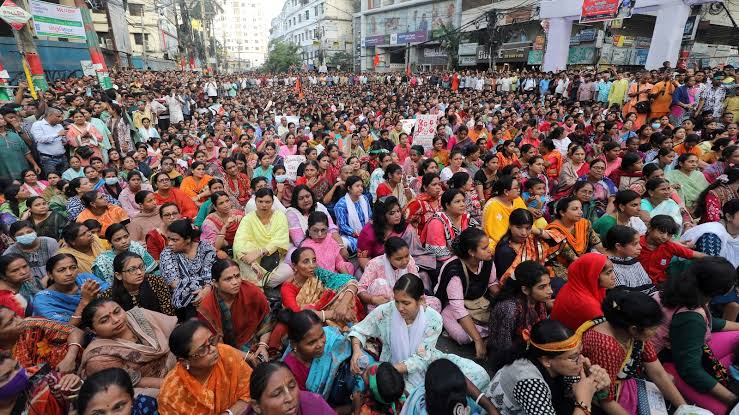After silently enduring extreme cruelty, Hindus in Bangladesh begin protesting

By Salah Uddin Shoaib Choudhury
In recent months, Bangladesh has witnessed an alarming surge in violence and persecution against its Hindu minority, culminating in mass protests and growing international concern.
The arrest of Chinmoy Krishna Maharaj, a prominent Hindu leader, on dubious sedition charges has become a flashpoint for escalating tensions.
As Hindu communities rally to demand justice, they face brutal crackdowns and attacks, drawing parallels to some of the darkest chapters in the region’s history.
According to latest media reports, Chinmoy Krishna Maharaj still remains imprisoned at Chittagong Central Jail, while there are allegations of not providing him required medicines and Sanatan food.
At the same time, his lawyers are reportedly obstructed from moving bail petition in the higher court seeking bail of Chinmoy Krishna Maharaj. It is also stated, Chittagong Central Jail, where Chinmoy Maharaj is currently held is known as the epicenter of convicted jihadists belonging to various Islamist terrorist organizations, including Hizb Ut Tahrir, Jamaatul Mujahedin Bangladesh (JMB), Harkat Ul Jihad (HuJI), Ansar Al Islam and radical Islamist groups such as Hefazat-e-Islam (HeI), who may pose life risk to the Sanatan monk.
Chinmoy Krishna Maharaj, leader of the Sammilito Sanatan Jagran Jote, was sent to prison by a Chittagong Metropolitan Magistrate on November 26 in a controversial sedition case filed by an individual later identified as a leader of the Bangladesh Nationalist Party (BNP).
Prabhu, a monk who led multiple protests against atrocities targeting Hindus in Bangladesh, was arrested by the Dhaka Police’s Detective Branch on November 25 at Dhaka Airport.
Following Maharaj’s arrest, thousands of protesting Hindus began chanting the slogan “Jai Shri Ram” and attempted to obstruct the prison van transporting him from the court to Chittagong Central Jail.
During this protest, radical Islamic groups suddenly attacked the demonstrators in the presence of law enforcement officials. Amid the chaos, Saiful Islam, an Assistant Public Prosecutor, was brutally killed.
In response, leaders of the Anti-Discrimination Student Movement demanded that ISKCON be labeled a terrorist organization and called for the arrest of Saiful Islam’s killers.
Meanwhile, according to reports on social media, Islamists and anti-Hindu elements have been attacking Hindu homes, businesses, and temples in Chittagong and surrounding districts.
In the early hours of November 27, miscreants set fire to the Manasa Mata Temple in the Methor Patti area of Chittagong city. Almost simultaneously, the Kali Temple in Hazarigalli was torched by Islamist mobs. Dozens of Hindu homes belonging to the Harijan community were also set ablaze.
Extremists have taken to social media, urging fellow Muslims to “sharpen knives” for slaughtering ISKCON members.
Hindus in Chittagong city, in particular, are enduring an unbearable ordeal, reminiscent of the atrocities perpetrated by Pakistani occupation forces and their local collaborators on the night of March 25, 1971.
Unless these acts of violence are halted by the state, dozens of Hindus risk being slaughtered, and Hindu women face the threat of physical assault and rape.
The surge in violence and systematic persecution of Hindus began after Sheikh Hasina abruptly fled Bangladesh on August 5, 2024, amid widespread protests.
On August 8, a revolutionary Islamist government was sworn in, with Nobel laureate Muhammad Yunus as the chief advisor.
Yunus, a known donor to the Clinton Foundation, allegedly received strong backing from prominent Democratic Party leaders, including Barack Obama, Bill Clinton, and Hillary Clinton.
According to a leaked diplomatic cable from WikiLeaks, Hillary Clinton exerted pressure on Bangladesh’s military in 2007 to make Yunus the head of an interim government.
Since August 2024, Hindus in Bangladesh have faced relentless attacks on their homes, businesses, and temples. Local media have been barred from covering these incidents, and most international media outlets, barring a few Indian ones, have refrained from reporting on these horrors.
Members of the “Stranded Pakistanis” community, also known as Biharis, have reportedly joined these acts of violence against Hindus.
Despite the severity of these crimes, rights groups such as Amnesty International and Human Rights Watch have remained silent, likely due to Yunus’s influence and his connections to the Biden administration.
On September 26, 2024, during his visit to the United States for the UN General Assembly, Muhammad Yunus was honored by the Clinton Global Initiative.
At the event, Bill Clinton praised Mahfuz Alam, a leader of the banned Islamist group Hizb ut-Tahrir, which advocates for the establishment of a caliphate.In October, the interim government in Bangladesh officially banned the Bangladesh Chhatra League (BCL), the student wing of the Awami League, labeling it a “terrorist organization”.
Reports suggest that the government is also considering banning the Awami League from political participation entirely.
This would leave Bangladesh’s political landscape dominated by Islamist forces, with little to no representation for religious minorities such as Hindus and Christians.
Yunus’s government has also freed convicted terrorists, including Jashimuddin Rahmani, the leader of the al-Qaeda-affiliated Ansarullah Bangla Team, who was convicted of abetting the murder of a secular blogger in 2013.
Following the arrest of Chinmoy Krishna Maharaj, ISKCON temple authorities called on the Indian government to intervene, asserting that ISKCON has no links to terrorism. On its official social media account, the organization denounced the charges against Maharaj as baseless.
India’s Ministry of External Affairs issued a statement on November 26, expressing deep concern over the arrest and denial of bail for Maharaj, as well as the attacks on Hindus and other minorities in Bangladesh.
The ministry urged the Bangladeshi government to protect the rights and safety of all minorities.The Ministry of External Affairs in its statement said:We have noted with deep concern the arrest and denial of bail to Shri Chinmoy Krishna Das, who is also the spokesperson of the Bangladesh Sammilit Sanatan Jagran Jote.
This incident follows the multiple attacks on Hindus and other minorities by extremist elements in Bangladesh. There are several documented cases of arson and looting of minorities’ homes and business establishments, as well as theft and vandalism and desecration of deities and temples.It is unfortunate that while the perpetrators of these incidents remain at large, charges should be pressed against a religious leader presenting legitimate demands through peaceful gatherings.
We also note with concern the attacks minorities’ homes and business establishments, as well as theft and vandalism and desecration of deities and temples.It is unfortunate that while the perpetrators of these incidents remain at large, charges should be pressed against a religious leader presenting legitimate demands through peaceful gatherings.
We also note with concern the attacks on minorities protesting peacefully against the arrest of Shri Das.
We urge Bangladesh authorities to ensure the safety and security of Hindus and all minorities, including their right of freedom of peaceful assembly and expression.
Bangladesh’s Ministry of Foreign Affairs, however, dismissed India’s concerns as “unfounded” and claimed they misrepresented facts. This denial underscores Dhaka’s reluctance to acknowledge the persecution of Hindus.
The worsening situation could strain Bangladesh-India relations further, especially with the possibility of a Trump administration, as Muhammad Yunus is known to be a vocal critic of Donald Trump.
The ongoing atrocities have already sparked outrage among Hindus in India and among international human rights organizations, potentially leading to broader geopolitical repercussions.
The ongoing persecution of Hindus in Bangladesh underscores a deeper crisis of governance and religious tolerance in the country.
The international community must recognize the gravity of this situation and push for immediate action to protect minority communities from further harm. As the interim government led by Muhammad Yunus faces mounting criticism, its response -or lack thereof – will not only define Bangladesh’s internal stability but also shape its diplomatic relations, particularly with India and the upcoming US administration.
Without decisive intervention, the unchecked violence risks spiralling into an even greater humanitarian tragedy, leaving scars that could take generations to heal.
Failure to act decisively risks emboldening extremist forces and perpetuating cycles of violence and discrimination.
The time for silence has passed – global solidarity and swift action are essential to protect the lives, dignity, and freedoms of Hindus and other vulnerable communities in Bangladesh.




